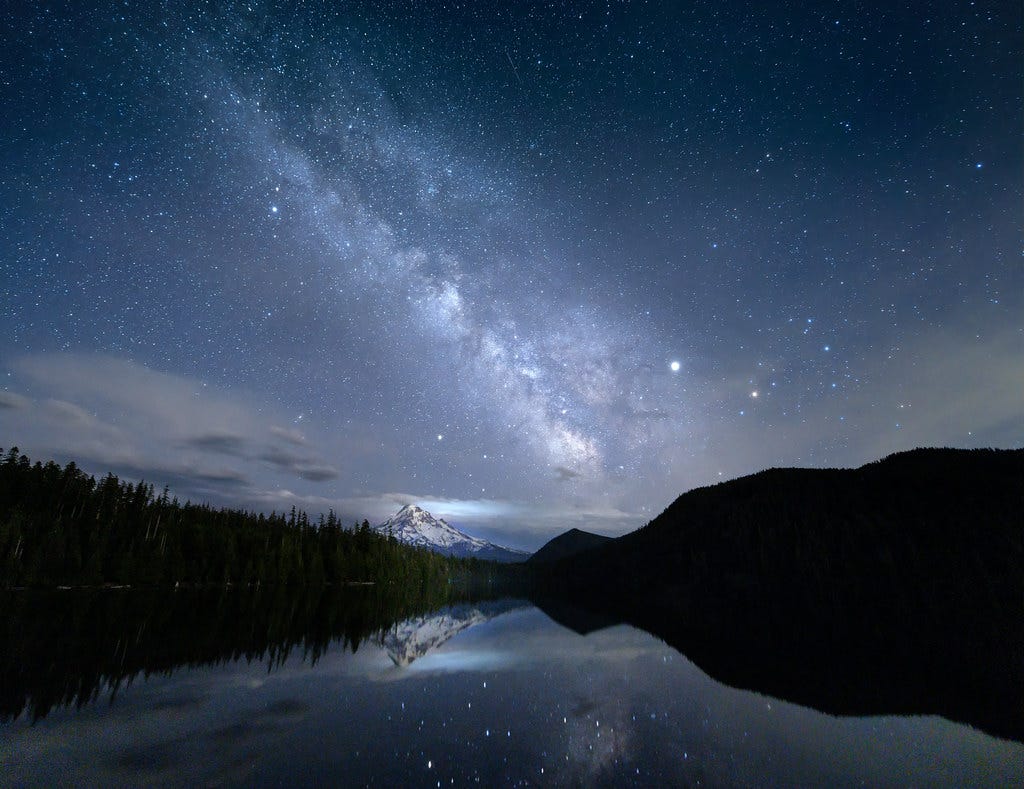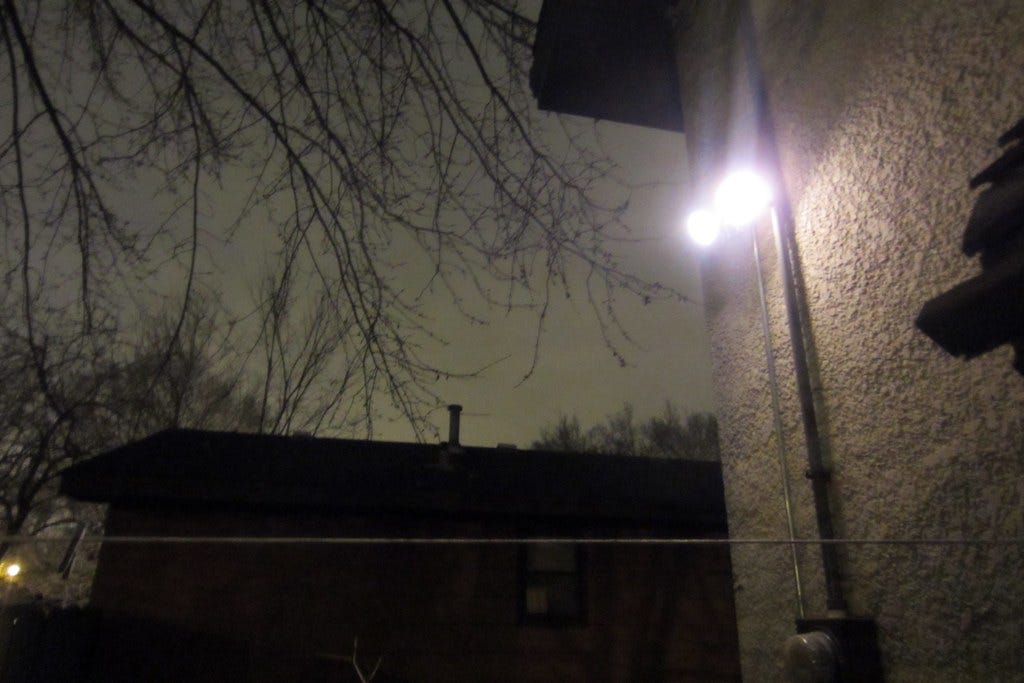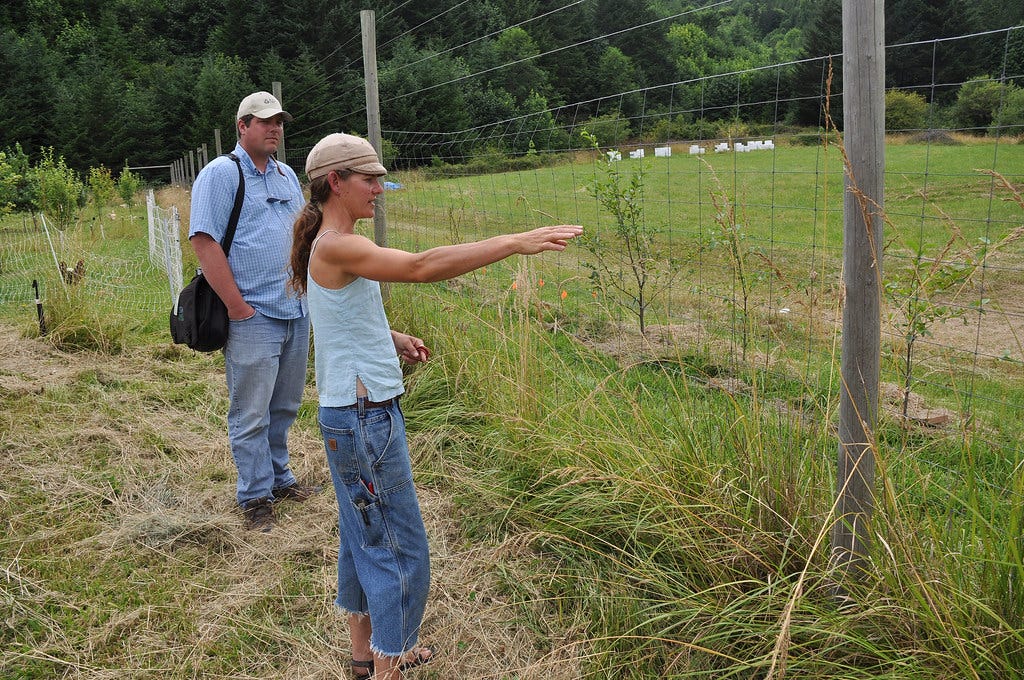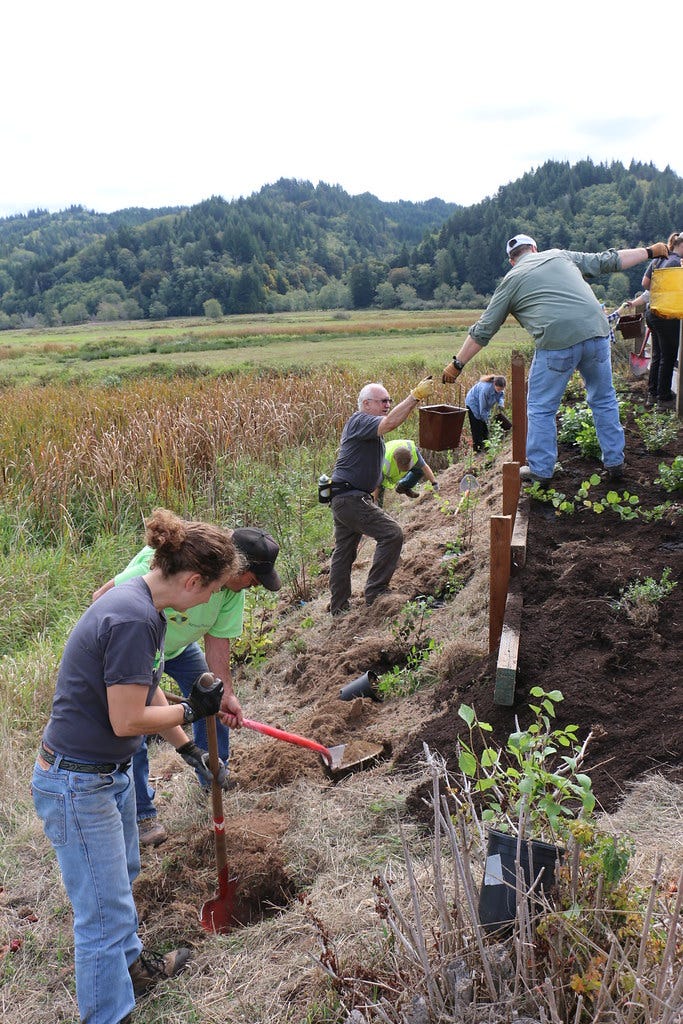Christina deVillier: Acting at the Scale of our Agency
We can live with each other, we can solve things together. It’s a tiny thing, yep. But when I zoom out from the tiny solutions, I like the bigger ones I start to see.
Christina deVillier is a writer, a gardener, and a fourth-generation explorer of northeast Oregon's mountains, canyons, and communities.
A story about my neighbor

"The Milky Way over Mt. Hood with stars reflected in Lost Lake, Mt. Hood National Forest, Cascade Mountains, Oregon" by diana_robinson is licensed under CC BY-NC-ND 2.0
Let me tell you a story about my neighbor. It’s a simple story and a silly one, in some ways, but it illustrates an understanding I’ve been trying to hold onto in these crazy, heavy last weeks of 2020, and in the last few days before the election.
Here’s the story. A couple of years ago, my neighbor across the street built a new shop. It went up quickly and the finishing touch was a light: one of those super-bright blue-tinted security lights that have grown more and more popular over the last several years.
My husband and I are lucky to live in a rural county where, overall, there’s not much light pollution. On any clear night, we can see the Milky Way from our yard, watch meteors zoom by, and, on nights with a big moon, follow our shadows down the road and watch white-lit clouds unspooling west to east. We love these night skies, and sleep soundly in the dark quiet.
My neighbor’s new light lit our whole place harshly. It shone into our house and shone into our bedroom. I immediately began calling it the “alien abduction light.” It competed with the moon. It obliterated our night vision and disrupted our sleep.
Blinded by the light

"(11:366) Our weird alien looking backyard lights" by twodolla is licensed under CC BY 2.0
I was upset, and, like many cranky people in these times, I took my grievance to the internet and confirmed (for myself) that my feelings were justified. I read articles about the ways that artificial light at night messes with our health, light pollution’s effects on nocturnal animals and migrating birds, other rural communities touting starry night sky tourism, and the legal definitions of “light trespass” (yes it’s a thing). On top of my personal sleep disruption and the impacts to my skywatching, I was surveying pollinators at that time for work and had gotten very interested in insects. Bright lights at night are a huge factor in worldwide insect decline.
In short, I quickly grew obsessed and depressed (and literate and vocal) about the problem of artificial light at night: in general, at scale. My neighbor’s light became yet another reason to slip into my well-worn rut of grief and worry about our huge, growing, glittering, accelerating human impact on the overburdened planet.
I griped and doomscrolled and grieved about light pollution for nearly a year. I posted on Facebook suggesting I might run for county office on a platform solely focused on a Dark Sky Ordinance. A few of my friends thought that was a great idea and promised campaign contributions, which made me feel righteous.
Needless to say, I was coming at my problem sideways, in a pattern typical of our time which my husband has dubbed “passive-aggressive trickle-down social economics” (i.e., broadcast your grievance in the ether of social media and it’ll eventually make its way back to the person you actually have a problem with).
Meanwhile, the light was on. I thought I’d get used to it. But actually it bothered me more and more all the time.
Eventually I did realize that I had zoomed out so far from the trigger of my unhappiness that it was getting ridiculous. I’d complained impotently to enough people that it was beginning to be embarrassing. So I whiled away a few more weeks working up the courage to talk to my neighbor.
I should add, for context, that my husband and I have always gotten along just fine with this neighbor. Although my observations of his bumper stickers, boon companions, lawn care (impeccable, unlike mine), and recreational accoutrements suggest that we don’t see eye to eye on everything, he’s jumped our rigs a few times and is an upstanding member of our city council and has tolerated with good humor some decidedly unorthodox activities on our property.
A long overdue resolution

"Beth Hoinacki, of Goodfoot Farm and NRCS District Conservationist, Tom Snyder" by NRCS Oregon is licensed under CC BY-ND 2.0
Anyway, I called him over one day when we were both working out in our yards and asked if I could have a word. He looked a little nervous. I was nervous! Folks sometimes get defensive about their properties, and after all I’d been working myself into a lather about this for...a while. I was prepared to express my dismay: to field possible law and order concerns; to offer to buy him a different light or a different shade; even to drop a hint about the long arm of the light trespass law, if necessary...though I hoped it wouldn’t come to that.
After admitting that I’d been getting up the nerve to talk to him for...way too long, I got to it.
“It’s about your light,” I said.
“My light?”
“The light on your shop.”
“My security light!”
“Well, it’s very bright. And it shines into our bedroom. And we really love our dark nights. And it’s just very very bright.”
He laughed. “Well gosh, you should have told me! I’ll just turn it off!”
And that was that. We talked about our fruit trees and weighed the pros and cons of various outdoor lighting fixtures for a few more minutes. And that night the light was off. I can’t even express the relief I felt (and how foolish I felt for not having talked to my neighbor ages ago). Now the light is off at night except when my neighbors are having a party. Happy ending!
If you’re laughing or rolling your eyes at me because I delayed a year before having this simple conversation, that’s fine, I agree, it is ridiculous! I’ve learned my lesson. The reason I wanted to share this story is because I’ve been thinking a lot lately about the ways we distract ourselves from directly addressing interpersonal conflicts—to the detriment of our personal wellness, our communities, and our ability to actually get shit done in our shared society.
Reducing the urge to scale

"2015 National Public Lands Day in Coos Bay!" by BLM Oregon & Washington is licensed under CC BY 2.0
Specifically, I’ve been thinking about the problem of scale—especially, scale in the information age.
The rabbit hole I went down the moment my neighbor’s light began to bother me was exactly the opposite of the way conflicts ought to be resolved in a community. But we live less and less in our physical communities and more and more in our virtual spaces. Something bothered me in my own home, in my own place, and instead of dealing with it at the point of origin, I zoomed out—I scaled it up. It was easy to go to the internet and develop my rationale for my feelings, to contextualize my problem within the great machine of intersecting problems I know must be solved, if we’re to survive, if my kids are to thrive—solved by someone, I mean. I built a bibliography for my indignation, and shared my problem with everyone who already agreed with me. We snarked in a loop and didn’t solve a thing.
I remember saying to one of my colleagues, after a night of disrupted sleep, while reading about the “insect apocalypse,” in a moment of deep grief about biodiversity loss: “It’s hard to believe we’ll ever make anything better if we won’t even turn our damn lights off when we don’t need them!”
But the thing is, I hadn’t even asked my neighbor to turn off his light, yet. And when I asked him, he did.
Most of the conflicts and problems that matter to us on a personal level reflect conflicts and problems that are unfolding in the wider world. These days, in this information-rich media environment, you can (and we do) zoom out from just about any personal conflict until it is too big for you, an individual in a community, to solve.
If we stay there, if that’s the scale at which we pay attention to our problems, we feel paralyzed. Of course we do: there are no levers we can pull, at that scale. Sometimes, in my more cynical moods, I think this is how the people in power keep their power: by theatricizing political and other conflicts at a scale where most of us can’t pull the levers. So our energy is sapped and we don’t pull any levers at all. Just commute to the job, secure the paycheck, then go home, eat food made out of subsidized agribusiness, and watch reruns of Our Planet on Netflix.
But almost any problem that feels overwhelming at scale—political division; climate change; the decay of consensus reality—has a scale where you can pull the levers, a scale at which you can apply your agency. And tackling problems at this scale may be the only way to solve them. At least, I think it’s the practical place to begin.
When my neighbor turned off his light, it was a little win for the insects in my garden and the owls, and a big win for my sleep (and maybe for his, too). We didn’t solve the light pollution crisis, but we took a step in the right direction.
Our conversation was also small-town politics, and today, on the brink of one of the most divisive presidential elections in American history, that feels especially relevant. We can zoom out to the trolls and the hashtags of the movements and the squabbles of diplomats and the Punch & Judy show on the debate stage, or we can zoom in and solve a simple conflict between neighbors.
My neighbor turned off his light. I hope, someday, he’ll ask me to do something differently and I’ll be able to return the favor. Our mutual willingness to meet on the fenceline and hash it out is evidence that, for all our ostensible differences, we are humans interested in our collective wellbeing: good neighbors in our tiny corner of the world. It makes me think: we can live with each other, we can solve things together. It’s a tiny thing, yep. But when I zoom out from the tiny solutions, I like the bigger ones I start to see.
************************
Keep the conversation going: Facebook (facebook.com/oregonway), Twitter (@the_oregon_way)
#48



